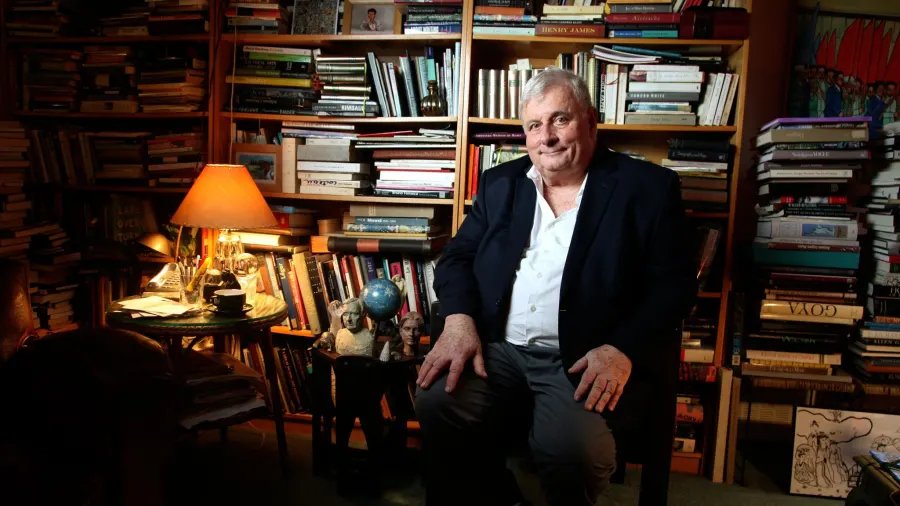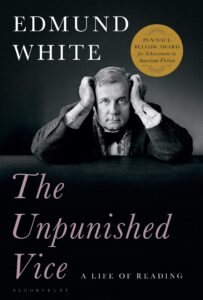Interview by John Wisniewski
John Wisniewski: When did you begin writing Edmund?
Edmund White: I began writing when i learned how to write. One of my first efforts was done when I was eight or nine, a short history of my maternal great-grandparents, the Oakes, who were homesteaders in East Texas. I remember I had a lot of help on that one. It was published in the Stephenville Empire-Tribune, complete with a picture of me in shorts hugging our collie , Timmy. In grade school I wrote plays about the Bluebird (for which I rented a velvet suit at a professional Dallas costume supplier) the Death of Hector (the cutest boy in fourth grade played Achilles, who stabbed me to death). At summer camp I died again, this time as Boris Goudonov. After that I began writing in eighth grade, encouraged by my teacher Mrs. Kincaid; I turned out an imitation of Pope in rhymed couplets called The Seasons. I was interested in famous men in history—I wrote a long narrative poem about Siddhartha, started a biography of Peter the Great, longed to be a Napoleon until I went to Culver military academy for a summer and hated the discipline. As a sophomore in high school I wrote my first novel, which my mother’s secretary typed from my holograph. It was called The Tower Window and was about a teen named Peter Cross who falls for a Mexican man after he’s rejected by a girl, a fellow student. As a senior I wrote a novel, Mrs. Morrigan, about a married woman who turns nympho and courts danger. In college, the University of Michigan, I put together a collection of stories and won a minor Hopwood prize, then won a major one with a play, The Blueboy in Black, which the next year was staged off-Broadway with Cicily Tyson and Billie Dee Williams. I wrote many unstaged plays in New York and three unpublished novels until when I was age 32 Forgetting Elena was published, something I’d written at 29.
John Wisniewski: Any favorite authors?
Edmund White: My favorite authors are Nabokov and Christopher Isherwood, two men who are polar opposites. Whereas Isherwood was a master of the plain style, had strong leftist political beliefs, loved America, wrote auto-fiction or autobiography, Nabokov had a fancy, funny, erudite, playful style, was a right-winger and approved of our war in Vietnam, satirised America and avoided intimacy with the reader. I had some slight contact with both writers. Later, I came to love Henry Green and Rebecca West (especially for her novel, The Fountain Overflows), Jean Genet, Malaparte (specially for Kaputt), Knut Hamsun, Tolstoy, Lampedusa (specially for his story The Siren), Natalia Ginsburg, John McGahern, Penelope
Fitzgerald (The Blue Flower), Julien Gracq, Kawabata, Tanizaki,Proust and many others…..
John Wisniewski: Your latest is The Unpunished Vice: A Love Of Reading. Could you tell us why reading is so important to your life?
Edmund White: I’ve never known a writer who wasn’t a big reader. We writers pretend we’re self created but we learn so much from other books reviews and reactions of friends
John Wisniewski: Why did you choose to write your autobiography?
Edmund White: I’ve written several. My Lives was a way of examining themes (My Shrinks, My Blonds, etc. rather than telling my story chronologically), City Boy was a look at my New York in the 1960s and 70s , Inside a Pearl was a look at my Paris in the 1980s and 90s, The Unpunished Vice:A Life of Reading traces the importance of reading for me.
John Wisniewski: what interested you about the life of Rimbaud?
Edmund White: I idolized him as a teenager, as many adolescents do, because he was a prodigy, a genius, a rebel and homosexual, in practice if not by nature. His artistic life was extremely short, which was fitting to the format of brief lives. He was the first poet in history who didn’t make sense. Unfortunately, my love of truth and research made me de-mythologize him; he should have remained a myth.
John Wisniewski: You have written an introduction about Herman Melville, and a biography of Jean Genet. What interested you about both of these authors?
Edmund White: The introduction I wrote was to a novel by one of my favorite French writers, Jean Giono, who translated Moby-Dick (which I admire so much—the best American novel!) I was commissioned one year after Genet’s death to write his biography, which took seven years of my life. Our Lady of the Flowers must have been one of the first gay novels I ever read (in the early 1960s). For my biography I won the National Book Critics Circle award, mainly in recognition of my research.
John Wisniewski: Any favorite films Edumund?
Edmund White: I love Pasolini’s Teorema and Truffaut’s Jules et Jim.


